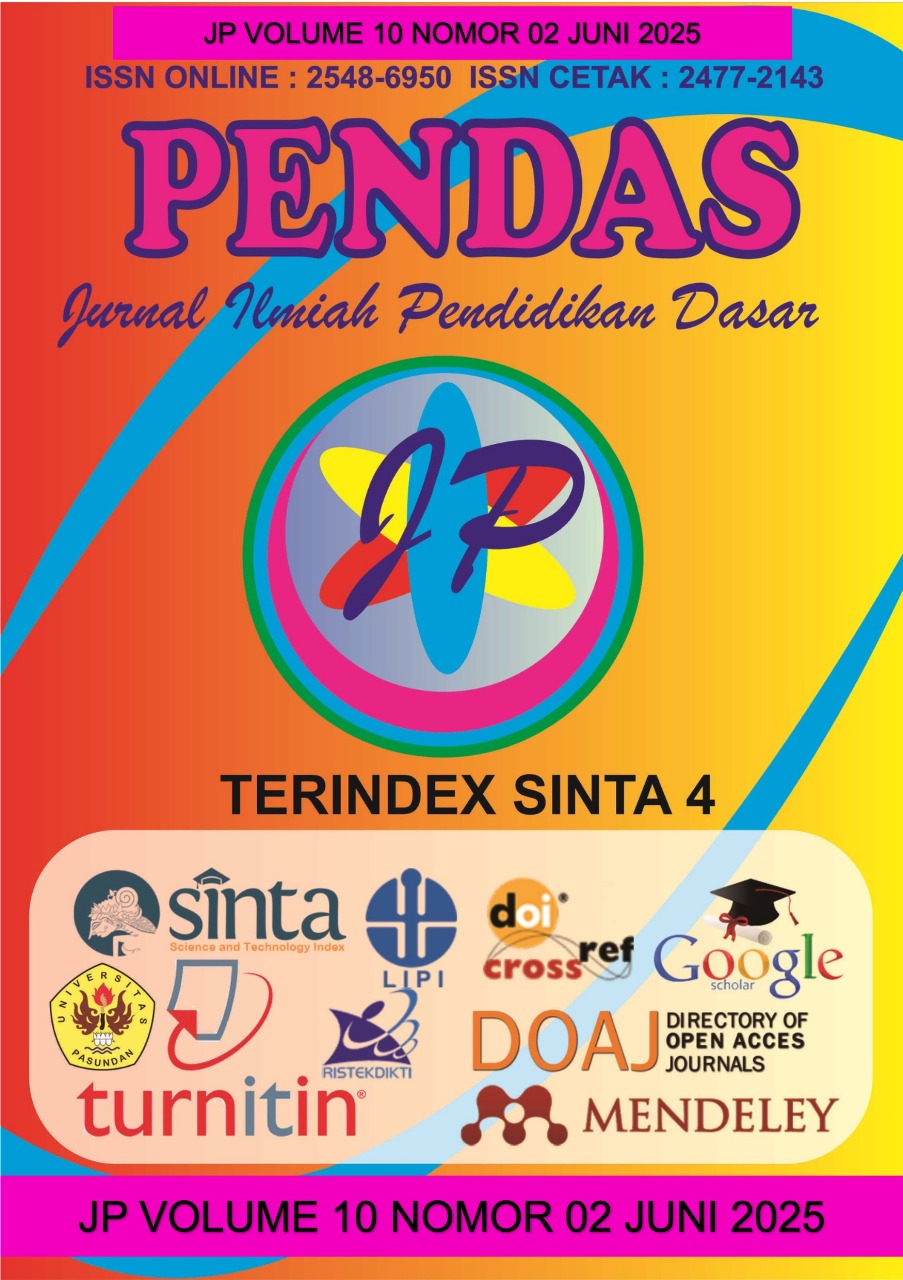MEMPERKUAT KARAKTER INTEGRASI NASIONAL MELALUI PENDIDIKAN PANCASILA DALAM UPAYA MENCEGAH TINDAK KEKERASAN DI SEKOLAH DASAR
DOI:
https://doi.org/10.23969/jp.v10i2.30533Keywords:
National Integrity, Pancasila Education, Preventing ViolenceAbstract
Education plays a crucial role in instilling the values of national integration from an
early age. Elementary school (SD) as the first formal education level has a great
responsibility in shaping the character of students who have a deep understanding of
national identity, tolerance, and respect for differences. Using a qualitative approach, this
research aims to explore in depth how Pancasila Education plays a role in shaping the
character of national integration in students of SD No. 1 Pangsan and how this character
building contributes to preventing acts of violence in the school environment.
Based on the results of interviews and observations with principals, teachers,
committees and students, the results show that students at SD No. 1 Pangsan have been able
to internalize the values of Pancasila and national integration in an effort to prevent violence
in the school environment. The implementation of strengthening the character of national
integrity through Pancasila Education at SD No. 1 Pangsan comprehensively for students
is to have a better understanding of the importance of unity, tolerance, and respect for
differences. They will also be more aware of the negative impacts of violence and have the
skills to prevent and resolve conflicts peacefully. The internalization of Pancasila values
will be reflected in students' daily attitudes and behaviours, such as respecting each other,
helping friends, avoiding bullying, and participating in school activities. The
recommendations for optimizing the formation of national integration character through
Pancasila education in an effort to prevent acts of violence at SD No. 1 Pangsan are the
active role of teachers to improve competence through training, create a conducive school
atmosphere, and involve the role of parents and the community in shaping student
character.
Downloads
References
Liata, N., & Fazal, K. (2021). Multikultural
dalam perspektif sosiologis. Abrahamic
Religions: Jurnal Studi Agama-
Agama, 1(2), 188-201.
Misbah, M. (2015). Peran Pendidikan
Pancasila dalam Pembentukan Karakter
Bangsa. Jurnal Kewarganegaraan, 3(1),
50-65.
Nurhakim, H. Q. A., Sanusi, I., Nur'aeni, U.,
& Muhammad, G. (2024). Implementasi
Profil Pelajar Pancasila Guna
Pencegahan Tindak Perundungan
Siswa. Tapis: Jurnal Penelitian
Ilmiah, 8(2), 166-178.Olweus, D.
(1993). Bullying at school: What we
know and what we can do. Blackwell
Publishing.
Permendikbud No 46 Tahun 2023. Diakses
dari
https://sman15tanjabbarat.sch.id/read/8
7/enam-jenis-kekerasan-di-sekolah-
menurut-permendikbud-ppksp-
waspadai
Sa'ida, I. A. (2022). Pengaruh model
projectbased learning pada mata kuliah
pendidikan kewarganegaraan terhadap
karakter integrasi nasional mahasiswa
teknik informatika. EDU
RESEARCH, 3(2), 35-47.
Sakhi, R. G., & Najicha, F. U. (2023).
Memperkuat integrasi nasional dengan
memanfaatkan generasi muda dan
teknologi pada pembelajaran pendidikan
kewarganegaraan. Journal Pendidikan
Ilmu Pengetahuan Sosial, 15(Special-1),
529-537.
Hamja, B. (2017). Pancasila sebagai dasar
Samani, M., & Hariyanto. (2012). Konsep
dan Model Pendidikan Karakter. PT
Remaja Rosdakarya.
negara dan ideologi bangsa. Justisia-
Saputra, A. M. A., Tawil, M. R., Hartutik,
Jurnal Ilmu Hukum, 3(9), 11-20.
H., Nazmi, R., La Abute, E., Husnita, L.,
Komnas Anak. (2023). Data Kekerasan
Terhadap Anak Tahun 2022. Jakarta:
Komisi Nasional Perlindungan Anak.
... & Haluti, F. (2023). Pendidikan
Karakter Di Era Milenial: Membangun
Downloads
Published
Issue
Section
License
Copyright (c) 2025 Pendas : Jurnal Ilmiah Pendidikan Dasar

This work is licensed under a Creative Commons Attribution 4.0 International License.














































